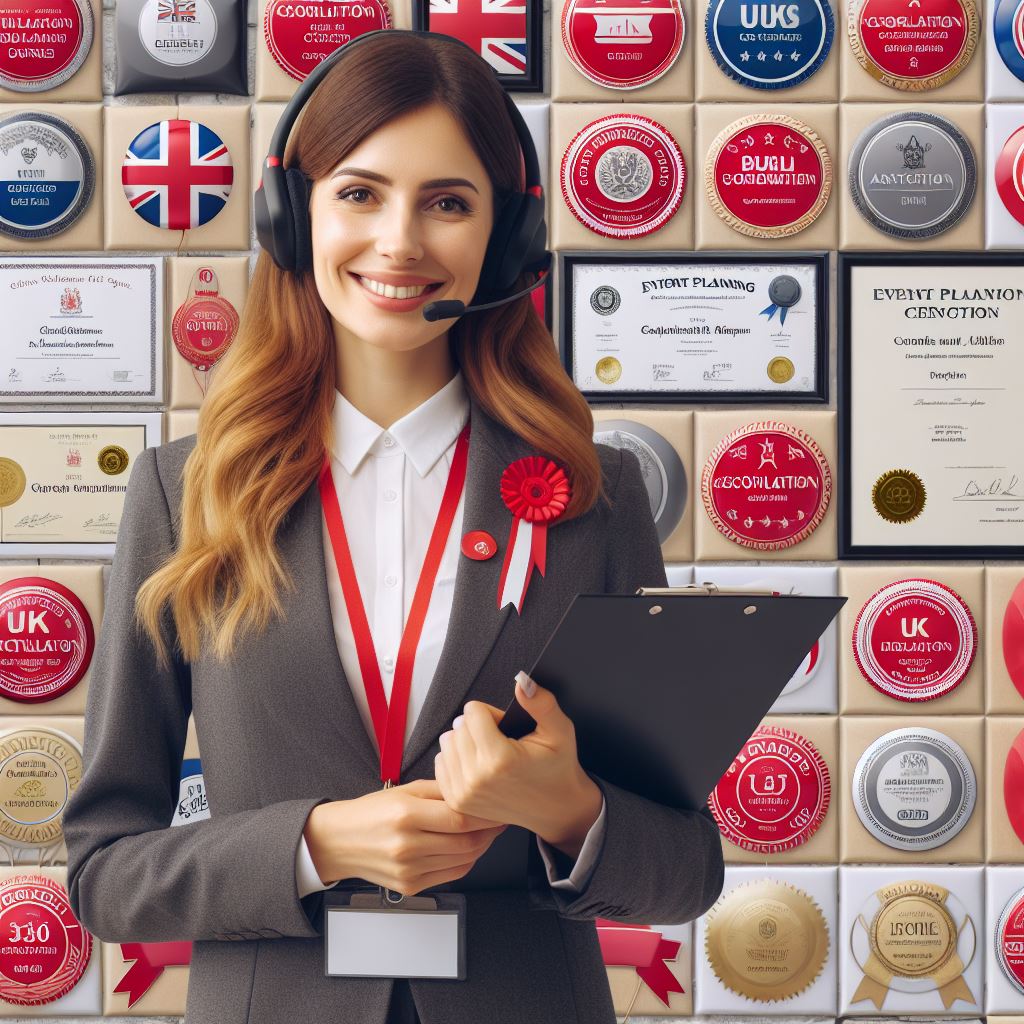Introduction
The UK has a rich festival culture, with a growing popularity of festivals in the country.
With hundreds of festivals taking place each year, event planners play a crucial role in ensuring their success.
Event planning is a complex and demanding task but is essential for creating unforgettable experiences for festival-goers.
From small local events to large international festivals, event planners are responsible for coordinating various aspects of the festival, such as logistics, vendor management, programming, and safety measures.
By meticulously organizing and executing these elements, event planners ensure that festivals run smoothly and provide an enjoyable experience for attendees.
Furthermore, event planners are instrumental in curating diverse lineups of artists, musicians, and performers, catering to a wide range of audiences’ tastes and interests.
They work closely with a team of professionals to design unique and memorable experiences, from stage layouts and visual presentations to immersive installations and interactive activities.
In addition to the artistic aspect, event planners also establish partnerships with sponsors and vendors, negotiate contracts, and manage budgets to ensure the overall financial success of the festival.
Ultimately, their role extends far beyond logistical considerations, as event planners shape the identity and atmosphere of festivals, making them an indispensable part of the UK festival culture.
Overview of UK Festivals
In the United Kingdom, there is a wide array of festivals that cater to different interests and tastes.
These festivals attract both locals and tourists from around the world, making them significant events in the country’s cultural calendar.
1. Glastonbury Festival
- Glastonbury is one of the most famous festivals in the UK, featuring a diverse range of music genres.
- It showcases artists from various backgrounds, including rock, pop, indie, electronic, and folk.
2. Notting Hill Carnival
- Notting Hill Carnival celebrates the vibrant Caribbean culture, attracting millions of visitors.
- It showcases colorful parades, Caribbean music, dance performances, and mouthwatering cuisine.
3. Edinburgh Festival Fringe
- The Edinburgh Festival Fringe is the world’s largest arts festival, drawing artists from all disciplines.
- It offers a platform for theater, comedy, dance, music, and visual arts performances.
4. Leeds Festival
- Leeds Festival is a renowned music event that caters to fans of rock, alternative, and electronic music.
- It hosts a mix of established and emerging artists, creating an unforgettable live music experience.
5. Chelsea Flower Show
- The Chelsea Flower Show is a prestigious horticultural event, showcasing stunning flower displays.
- It attracts gardening enthusiasts, professionals, and those who appreciate natural beauty.
6. Download Festival
- Download Festival is a paradise for heavy metal and rock fans, featuring iconic bands and emerging talents.
- It offers exhilarating performances and a unique camaraderie among festival-goers.
7. Hay Festival
- Hailed as the “Woodstock of the mind,” Hay Festival celebrates literature, ideas, and storytelling.
- Authors, intellectuals, and book lovers gather to discuss and explore various literary themes.
8. Carnaval de Nice
- Carnaval de Nice is a cultural extravaganza displaying colorful parades, floats, and entertainment.
- It showcases the rich traditions and vibrant spirit of the French Riviera.
These festivals demonstrate the diverse themes and genres that exist within the UK’s cultural scene.
From music to arts, literature to gardening, and cultural celebrations, there is something for everyone to enjoy.
The festivals contribute not only to the cultural enrichment of the country but also to its economy through increased tourism and revenue generation.
Read: The Rise of Female Chefs in the UK Scene
Importance of Event Planners in UK Festivals
Event planners play a crucial role in organizing successful festivals in the UK.
They undertake various responsibilities, ensuring that everything runs smoothly and attendees have a memorable experience.
Here are some reasons why event planners are essential:
1. Overall Festival Organization
- Event planners are responsible for the overall organization of festivals in the UK.
- They ensure that all necessary permits and licenses are obtained for the event to take place.
- They coordinate with different vendors, suppliers, and artists involved in the festival.
- Event planners create a comprehensive schedule for each day, including performances, workshops, and other activities.
2. Budget Management
- Event planners handle budget management, ensuring that all expenses are accounted for.
- They negotiate contracts with suppliers and artists to get the best deals within the allocated budget.
- Event planners monitor expenses closely to prevent overspending and ensure financial stability.
3. Venue and Logistics
- Event planners scout and select suitable venues for festivals, considering factors like capacity, accessibility, and facilities.
- They coordinate with venue owners and managers to arrange the necessary logistics, such as staging, sound systems, and lighting.
- Event planners manage transportation and parking arrangements for attendees, ensuring a smooth flow of traffic.
4. Marketing and Promotion
- Event planners develop strategic marketing plans to promote festivals effectively.
- They utilize various channels like social media, websites, and traditional advertising to reach the target audience.
- Event planners collaborate with PR agencies and media partners to secure coverage and maximize exposure.
- They create engaging content and ensure consistent branding to attract attendees and generate excitement.
5. Safety and Security
- Event planners prioritize the safety and security of festival attendees and staff.
- They work closely with local authorities and security firms to develop comprehensive emergency response plans.
- Event planners implement crowd control measures to prevent overcrowding and ensure a safe environment.
- They coordinate with medical teams to provide first aid and medical assistance on-site.
6. Customer Experience
- Event planners strive to create an exceptional experience for festival attendees.
- They curate a diverse lineup of artists and performances to cater to different tastes and preferences.
- They coordinate interactive activities, workshops, and installations to enhance the overall festival experience.
- Event planners gather feedback from attendees to continuously improve future festivals.
7. Crisis Management
- In case of unexpected challenges or emergencies, event planners are equipped to handle crisis situations.
- They have contingency plans in place and know how to make quick decisions to minimize disruption.
- Event planners work with local authorities and relevant stakeholders to mitigate any potential risks.
In fact, event planners play an indispensable role in organizing UK festivals.
Their responsibilities span from overall festival organization and budget management to venue logistics, marketing, safety, and customer experience.
Their expertise ensures that festivals are successful, leaving attendees with unforgettable memories.
Read: Waitstaff Tips: Enhancing Customer Service in the UK

Responsibilities of Event Planners
Event planners play a pivotal role in the success of UK festivals.
Their responsibilities can be divided into various stages that require active engagement, coordination, and problem-solving skills.
Pre-Event Planning
During the pre-event planning phase, event planners are involved in selecting the festival location.
They consider factors such as accessibility, capacity, and suitability for the festival’s theme.
Additionally, they must secure necessary permits and licenses to ensure legal compliance.
This involves coordinating with appropriate authorities and agencies.
Creating a budget and arranging funding is another crucial task for event planners.
They need to estimate expenses for logistics, artist fees, marketing, and other aspects.
They also seek sponsors, grants, and partnerships to secure financial support for the festival.
Programming and Logistics
In the programming and logistics phase, event planners curate the festival lineup and schedule.
They work closely with artists, vendors, and suppliers to ensure a diverse and engaging program.
Coordinating stage setups, sound systems, and technical aspects is crucial to provide a seamless experience for both performers and attendees.
Marketing and Promotion
Marketing and promotion play a vital role in attracting a diverse audience to the festival.
Event planners develop strategies to reach potential attendees through various channels such as social media, advertisements, and collaborations with influencers.
They also manage ticket sales and distribution, ensuring a smooth process for festival-goers.
On-Site Event Management
On-site event management is where event planners truly shine.
During the festival days, they oversee operations and ensure everything runs smoothly.
This involves managing staff, coordinating with different teams, and handling any unforeseen circumstances that may arise.
They troubleshoot issues promptly to provide a seamless experience for all participants.
Event planners also play a crucial role in maintaining a safe and enjoyable environment.
They work closely with security teams and medical services to address any emergencies or incidents promptly.
Their ability to handle unforeseen circumstances and make quick decisions is vital in ensuring the well-being of attendees.
In essence, event planners are the backbone of UK festivals.
Their responsibilities span across different stages, starting from pre-event planning to on-site management.
Their expertise, coordination skills, and ability to handle unforeseen circumstances contribute to the success of festivals and provide memorable experiences for attendees.
Personalized UK Career Consulting
Receive tailored career guidance designed just for you. Get actionable steps and expert support to boost your career in 1-3 days. Take control of your career now.
Get StartedRead: The Evolution of Waiting Jobs in the UK Scene
Skills and Qualities of Event Planners
In the festival industry, event planners need to possess a set of skills and qualities that are essential for managing successful events.
Here are three key skills that event planners should have:
- They must possess strong organizational and multitasking abilities to handle various tasks simultaneously.
- Attention to detail and problem-solving skills are vital for managing logistics and unexpected issues.
- Effective communication and negotiation skills help them interact with clients and stakeholders.
Aside from these core skills, there are several other qualities that make a good event planner in the festival industry.
Here are some additional traits that can contribute to success:
- Creativity: They generate unique and memorable festival ideas.
- Pressure handling: Remaining composed under tight schedules and unforeseen challenges is crucial.
- Flexibility: Adapting to dynamic changes and sudden adjustments is necessary.
- Leadership: Effectively coordinating and motivating team members is important.
- Financial acumen: Managing budgets to ensure profitability and efficiency is crucial.
- Networking: Establishing vital connections with vendors and professionals for resources is imperative.
Overall, event planners need a combination of skills, qualities, and experience to excel in the festival industry.
It is a challenging profession that requires creativity, organization, and the ability to handle high-pressure situations.
With the right skill set and a passion for creating unforgettable experiences, event planners can play a significant role in the success of UK festivals.
Read: Top UK Restaurants: Waitstaff Experiences Shared
Challenges Faced by Event Planners
Organizing festivals poses challenges for event planners, demanding proactive solutions and innovative approaches.
- Unpredictable Weather: They must prepare for weather disruptions that might affect the festival.
- Managing Large Crowds: Ensuring crowd safety and event flow amid massive attendee numbers is crucial.
- Budget Constraints: They face the challenge of managing festivals within limited financial resources.
- Vendor Coordination: Coordinating multiple vendors for various festival needs demands logistical finesse.
- Permitting and Regulations: Navigating the complex process of permits and regulations is time-consuming.
- Security and Safety: Ensuring comprehensive safety measures and emergency plans for attendees.
- Infrastructure and Facilities: Arranging adequate facilities to provide a comfortable attendee experience.
- Technology Integration: Integrating technology for ticketing and payment options enhances the festival experience.
- Talent Booking: Attracting talented artists within budget and timelines poses challenges.
- Marketing and Promotion: Effective promotion across platforms is essential for attracting a large audience.
- Sustainability and Environmental Impact: Implementing eco-friendly practices to minimize environmental impact is crucial.
- Transportation and Accessibility: Ensuring smooth transportation and accessibility for attendees is essential.
Success hinges on event planners’ ability to proactively handle these challenges, fostering innovation.
Effective management of hurdles leads to well-executed festivals, offering attendees memorable experiences.
Success Stories
Event planners are instrumental in the success of UK festivals, contributing through meticulous planning and innovation:
- Glastonbury Festival: Owes its global acclaim to meticulous event planning strategies.
- Boomtown Fair: Blends interactive storytelling and theater, thanks to innovative planners.
- Latitude Festival: Offers diverse programming expertly curated by event planners.
- Notting Hill Carnival: Celebrates Caribbean culture, organized by instrumental event planners.
- Green Man Festival: Promotes sustainability, thanks to the efforts of event planners.
These festivals highlight the innovation and unique experiences crafted by event planners:
- Secret Cinema: Transports attendees into film worlds through immersive experiences.
- Shambala Festival: Engages in eco-conscious living beyond recycling efforts.
- Wilderness Festival: Crafts multisensory experiences with diverse activities.
- Lunar Festival: Showcases eclectic artists and avant-garde installations.
- Edinburgh Festival Fringe: Platforms for emerging artists organized by event planners.
Event planners’ success factors in these festivals encompass strategic planning, curation, experience, risk management, and collaboration:
- Strategic Planning: Detailed logistics, site design, and crowd management plans.
- Artistic Curation: Careful selection of diverse performers and engaging activities.
- Attendee Experience: Focuses on interactive installations and amenities.
- Risk Management: Implements safety measures for smooth festival execution.
- Collaboration: Works with stakeholders, sponsors, and local authorities for success.
Event planners continually innovate, setting benchmarks with festivals like Burning Man, Download Festival, and Royal Ascot:
- Burning Man: A global inspiration for radical community-building principles.
- Download Festival: Celebrates emerging music genres under event planners’ direction.
- Royal Ascot: Showcases planners’ elegance and meticulous event organization.
UK festivals’ triumph hinges on event planners’ dedication, creativity, and eye for detail, creating unforgettable experiences.
Conclusion
Event planners play a crucial role in the UK festival industry.
They are responsible for organizing and managing every aspect of these unforgettable events.
From securing permits and venues to coordinating vendors and entertainment, event planners ensure that festivals run smoothly and successfully.
Their hard work and dedication make it possible for attendees to have a fantastic and memorable experience.
Your Dream Job Starts with a Perfect CV
Get a tailored CV and cover letter that captures your unique strengths and stands out in your industry. Let us help you make an unforgettable first impression.
Get StartedIt is important for readers to appreciate the immense effort that event planners put into organizing these festivals.
Without their expertise and meticulous attention to detail, these events would not be possible.
Event planners work tirelessly behind the scenes to create unforgettable moments, all while ensuring the safety and enjoyment of festival-goers.
Next time you attend a festival in the UK, take a moment to appreciate the hard work and dedication of the event planners.
Their passion and commitment make it possible for us to enjoy these incredible events and create lasting memories.
Let us show them our gratitude and support, as they continue to enhance the festival industry in the country.
[E-Book for Sale]
500 Cutting-Edge Tech Startup Ideas for 2024 & 2025: Innovate, Create, Dominate
$19.99 • 500 Tech Startup Ideas • 62 pages
You will get inspired with 500 innovative tech startup ideas for 2024 and 2025, complete with concise descriptions to help you kickstart your entrepreneurial journey in AI, Blockchain, IoT, Fintech, and AR/VR.




